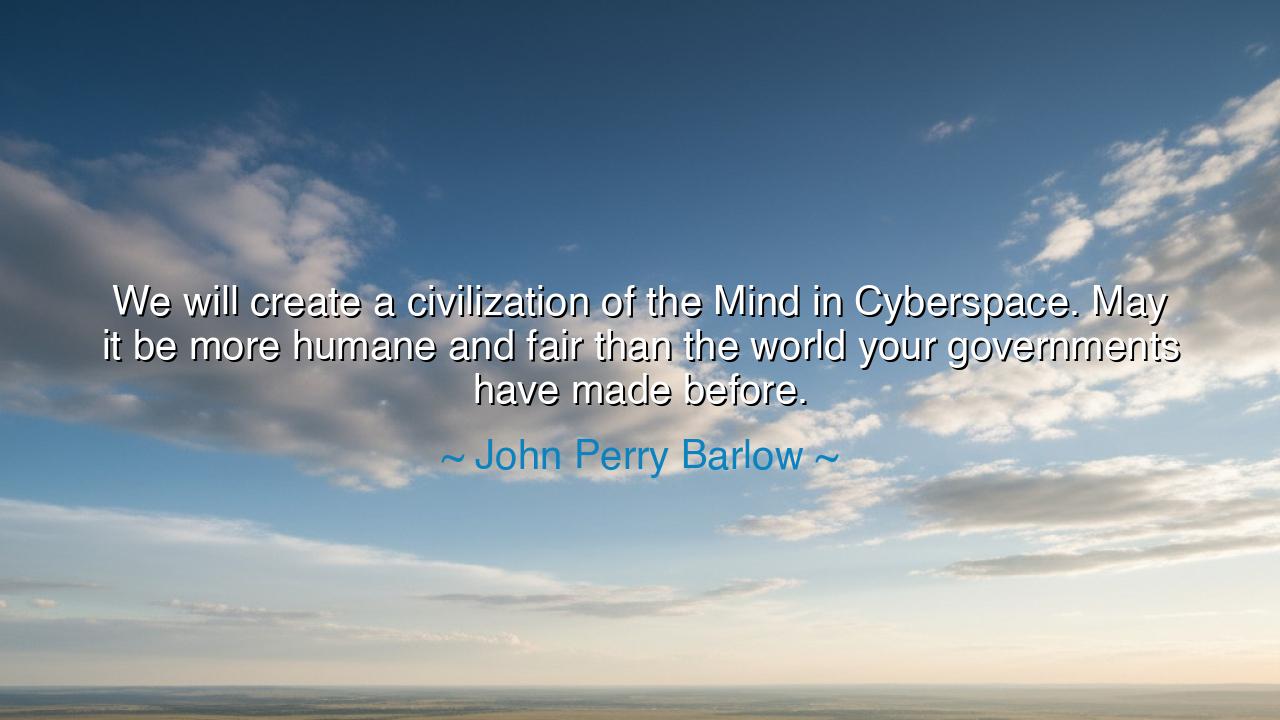
We will create a civilization of the Mind in Cyberspace. May it
We will create a civilization of the Mind in Cyberspace. May it be more humane and fair than the world your governments have made before.






Hear the words of John Perry Barlow, a poet of the digital frontier, who declared with fire and hope: “We will create a civilization of the Mind in Cyberspace. May it be more humane and fair than the world your governments have made before.” These words were written in 1996, in his Declaration of the Independence of Cyberspace, when the Internet was still young, when its promise shimmered like a sunrise over uncharted seas. In them, Barlow summoned humanity to dream of a new realm—untouched by borders, free from the chains of kings and bureaucrats, a place where ideas could flow without fear.
The phrase civilization of the Mind speaks to the essence of Cyberspace: it is not a land of soil and stone, but of thought and spirit. In the physical world, laws are enforced by armies and police. In this new world, laws would be enforced by code, culture, and community. It was a bold proclamation that in the age of the Internet, power would shift away from governments and institutions and into the hands of individuals connected across the globe. For here, in this civilization, a peasant could speak with the voice of a king, and an idea could travel farther than any army.
Barlow’s vision was also born in resistance. In his time, governments sought to regulate the growing Internet, to bind it with the same rules and hierarchies that had long governed the physical world. But he believed that this new Cyberspace was something different, something sacred. It was a realm where humanity could try again, free from the mistakes of the past. His words, “May it be more humane and fair,” were not only hope, but plea—that in this new world, justice might reign where it had so often failed in the old.
Consider the story of the Arab Spring in 2011, when citizens across the Middle East used digital tools—Facebook, Twitter, and blogs—to organize protests and share truths that governments tried to suppress. In those days, the Internet was the beating heart of a movement, giving voices to the voiceless and uniting the oppressed across borders. For a moment, Barlow’s dream seemed real: a civilization of the Mind, where freedom bloomed from shared information and human solidarity.
Yet, as with all visions, shadows followed. The same tools that empowered the weak were later wielded by the powerful. Surveillance grew. Disinformation spread. Corporations rose as new rulers of Cyberspace, hoarding data and shaping behavior for profit. Thus, Barlow’s prayer—“more humane and fair”—stands today as both prophecy and warning. For the dream of Cyberspace remains alive, but it is a dream that must be defended with vigilance.
The lesson, O seeker, is this: you are a citizen not only of your nation, but of this vast civilization of the Mind. What you write, what you share, what you build becomes part of the architecture of this new world. If you sow kindness, it grows; if you spread cruelty, it multiplies. In Cyberspace, every action is a brick, and together we are building either a temple of wisdom or a prison of shadows.
Practical steps follow: guard your digital voice as you would your honor. Use it to uplift, not to deceive. Support technologies and policies that protect privacy, encourage openness, and empower the many rather than the few. Build communities that reflect the fairness you would wish for in the physical world. For the Internet is not merely wires and code—it is humanity’s collective soul, magnified.
Thus, remember John Perry Barlow’s words: “We will create a civilization of the Mind in Cyberspace.” This is no idle fancy, but a sacred charge. May you, and all who enter this boundless realm, labor to make it a place of freedom, of justice, of compassion. For the world of governments may falter, but in this new world of thought, there lies still the hope of something nobler.






AAdministratorAdministrator
Welcome, honored guests. Please leave a comment, we will respond soon